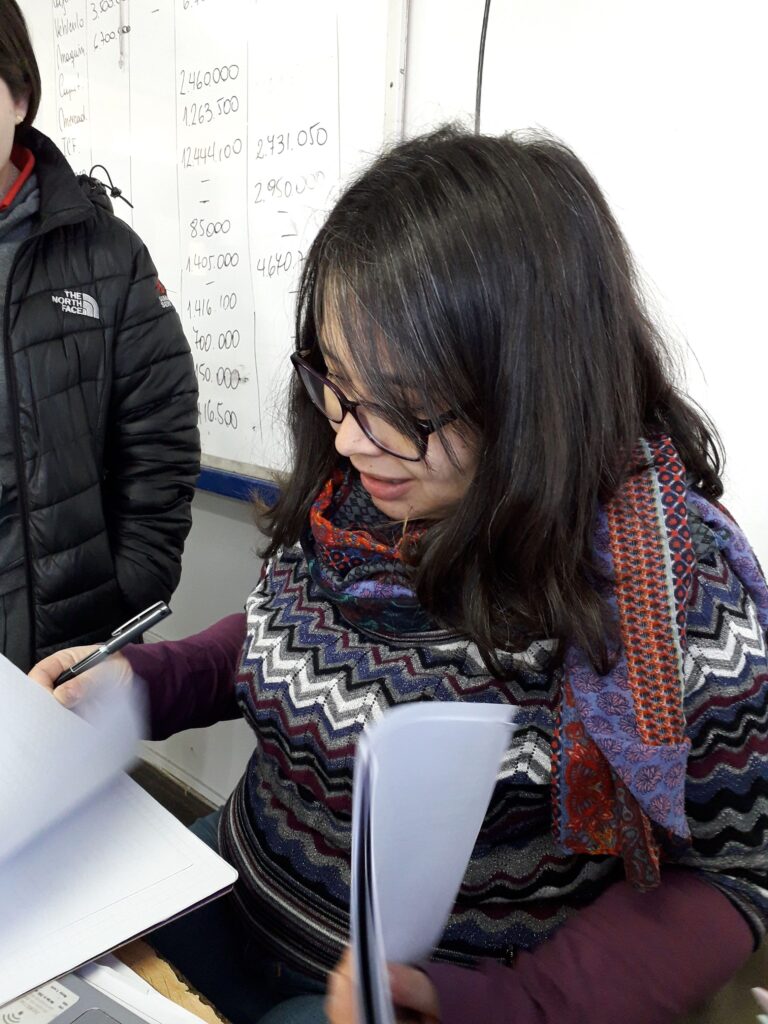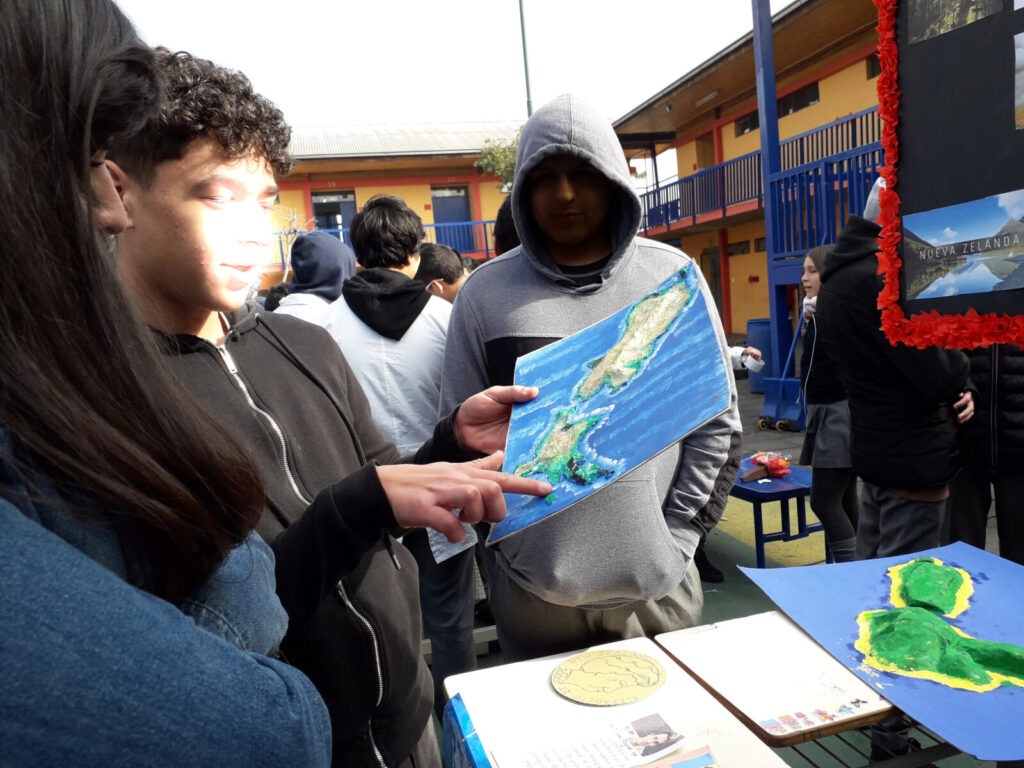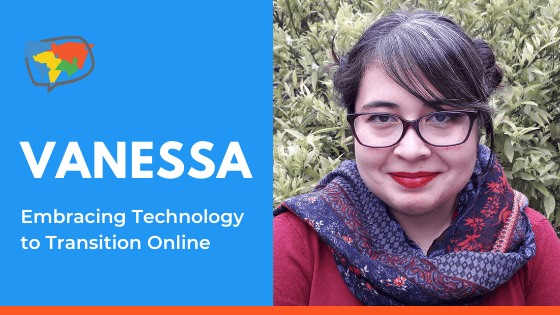Sparked by her interest in a British pop group, Vanessa Riquelme, from Chile, developed a fondness for the English language that led her to become an ESL teacher, working with both school kids and adults. She shares how she landed her current positions, her strategies for teaching English online to various age groups, and how she’s adapted to giving virtual classes during the current global crisis.
Hi Vanessa! Can you tell us a bit about yourself?
I’m from Chile, a Spanish speaking country where English is hardly ever practiced outside the learning context.
I started liking English in high school because I loved a British boy band, McFly. I just loved them and wanted to know everything about them, so I’d listen to their songs, and download the lyrics and translate them. I also loved Amy Winehouse and Coldplay, among other bands. So, listening to music was a great influence. Aside from learning through songs, reading the interviews in magazines was an incredible way to learn new words.
I learned English at university. I graduated with a degree in English Linguistics and Literature from Universidad de Chile in 2016, then I got my teaching degree at the same university two years later.
How did you get into teaching?
I decided to become an English teacher because I’ve always felt like I could help society in some way through education. I’ve been tutoring since my first year of university. I used to help young children with their homework. In the beginning, it was neighbors mostly, but then word spread and I had a couple of regular students.
In a more professional way, I’ve been teaching for three years now. In 2018, I started teaching adults to develop their communication skills. Last year, I got my first school teaching job at Colegio Técnico Profesional Aprender, where I was the main high school teacher. However, my contract with that school ended in February this year, then I couldn’t get a job until May and by that time schools were already having online classes, so I haven’t met my current students in person.
How did you land your first school teaching job? What was the application process like?
I sent tons of emails applying to schools that posted job advertisements online. I even went to drop my resume at the actual schools. It was hard to get my first job. Schools didn’t call me back. I went to three job interviews and got accepted to one of those schools.

Vanessa teaching in a classroom prior to the pandemic
Can you tell us more about your teaching job?
I’m currently teaching English online to teenagers and I’m also teaching at a language institute, helping adult professionals improve their communication skills.
At the moment, I’m working for two different schools, Centro Educacional Esperanza and Liceo Bicentenario Hermanos Sotomayor Baeza. In the first school, I teach 7th and 8th grade, and I teach high school students at the other one.
I’ve never been to the actual schools since I got both jobs while being in this pandemic and under quarantine. I’ve also never seen my students face-to-face, which has been a real challenge.
Both schools have a high percentage of vulnerable students. That means that a lot of them don’t have Internet access or a computer or cell phone to attend online classes, or they have more siblings who also have to attend online classes and they have to share the same device. So, their attendance may be unstable.
What’s your typical workday like?
On a typical workday, I wake up around 8 a.m. and start working at 9 a.m. When I don’t have classes early, I usually prepare material for the classes, check my email, or grade worksheets. When I have classes, I start teaching at 9 a.m. or 10 a.m. I have a very varied schedule, from day to day and from week to week, too. I also have tons of meetings with other teachers and the school management team. This new teaching reality has brought several challenges for us teachers as well as for our students and management team.
Can you outline some differences between teaching English to teenagers and teaching professional adults?
Both kinds of students have their own difficulties and particularities:
Teenagers
Adults
Should you teach kids, adults, or both? Read this guide to help you choose.
What strategies or activities do you like using in the online classroom?
In a general view, I try to start with the theory, followed by practice, and finishing with feedback. To make students practice, I use different online resources, like Google Forms and Jamboard. I think it’s a good way to check their progress and see how much they’ve understood from the class. I also use a platform called Nearpod, which has many interactive activities and games. Students like when learning feels like a game. We also have speaking practice and they turn their mics on to answer questions.
Learn more of the commonly used apps and technology for the virtual classroom in Bridge Specialized Certification Courses: Foundations and Advanced Methods in Teaching English Online.
How has your own experience of learning English helped you in teaching the language?
As I’m not a native speaker, I can empathize with my students’ fears and insecurities when learning English and when pronouncing new words, because I felt that way, too, when I was studying the language. I made tons of mistakes that helped me learn. I think that it’s important for students to know that it’s okay to make mistakes. I understand that making a sound that doesn’t occur in Spanish might feel weird, but it’s necessary to improve, for example. Or that they make certain mistakes because they are translating literally from Spanish, and I can address those mistakes properly because I understand its origin.

Vanessa’s students during an “English Fest” celebration at their school.
How has the COVID-19 crisis affected you as an English teacher?
Enormously. It’s very difficult to have established working hours. Working from home might seem easy, but it was difficult for my family to understand that even though I was at home, I was working and that I had to be online for a meeting, or preparing classes and material. It was like if I was not teaching I was free and available, but I wasn’t. Now, after five months they’ve finally understood. But establishing working hours is still a work in progress. I work during the night and on weekends because there are really too many things to do.
Get tips from a current online teacher on how to maintain a work-life balance.
Another very important point is that students are in a different mood, so teaching English is not the only thing we have to take into consideration. Students have been through a lot. Some of their parents lost their jobs and needed to find another one. Some of their relatives had gotten the virus and were very sick, so they were worried and scared. Online classes were another thing to worry about and some of them felt stressed and anxious about it.
Every student is a different reality, a different story, a different world in itself. We didn’t want them to be stressed over classes, but we wanted them to learn. So, we had to find a balance between the two.
How was it for you transitioning to online teaching?
I had to transition to online teaching because of the current pandemic. It caught me unprepared but I’ve learned a lot, and I continue looking for new resources and materials that make classes more dynamic and interesting for my students. I think I’m lucky, though. Many older teachers have struggled with this new method of teaching because they’re not used to using this amount of technology in their classrooms. I’ve always been “friends” with technology, so at least incorporating new gadgets and apps hasn’t been that difficult.
You earned the Bridge Master TEFL/TESOL Certificate. Why did you decide to take this course?
Last year, I was considering applying for teaching positions abroad. Even though I’m a professional teacher, I wanted to have an international certification. I have my university degree, but after doing some research I learned that many schools or agencies requested an international certificate.
How has this course helped you professionally?
Even though I couldn’t finish my applications because of the pandemic, I think that having an international certificate on my CV shows that I am a prepared teacher who is interested in continuing to learn new methods of teaching and being a better professional.
How have you used your Bridge digital badge for this course?
I put it on my LinkedIn profile.
Find out how you can use your Bridge digital badges to get TEFL jobs!
What are your plans for the next weeks or months as the world deals with the global pandemic?
It’s difficult to make plans with this global pandemic. I hope that the digital divide decreases so all students have access to online classes, as I don’t think we’ll go back to face-to-face classes until next year. I hope to continue teaching online, learning more about this new method, and trying that my students learn as much as possible, considering the context we’re living in.
Do you have any advice for English teachers who want to teach in Chile?
It depends on who they want to teach. However, if you’re a native speaker you’ll be very welcome. People here like native speakers. My advice is that you should be willing to learn about our culture and customs as well as sharing your own.






